The Intel Comet Lake Core i9-10900K, i7-10700K, i5-10600K CPU Review: Skylake We Go Again
by Dr. Ian Cutress on May 20, 2020 9:00 AM EST- Posted in
- CPUs
- Intel
- Skylake
- 14nm
- Z490
- 10th Gen Core
- Comet Lake
CPU Performance: Web and Legacy Tests
While more the focus of low-end and small form factor systems, web-based benchmarks are notoriously difficult to standardize. Modern web browsers are frequently updated, with no recourse to disable those updates, and as such there is difficulty in keeping a common platform. The fast paced nature of browser development means that version numbers (and performance) can change from week to week. Despite this, web tests are often a good measure of user experience: a lot of what most office work is today revolves around web applications, particularly email and office apps, but also interfaces and development environments. Our web tests include some of the industry standard tests, as well as a few popular but older tests.
We have also included our legacy benchmarks in this section, representing a stack of older code for popular benchmarks.
All of our benchmark results can also be found in our benchmark engine, Bench.
Speedometer 2: JavaScript Frameworks
Our newest web test is Speedometer 2, which is a accrued test over a series of javascript frameworks to do three simple things: built a list, enable each item in the list, and remove the list. All the frameworks implement the same visual cues, but obviously apply them from different coding angles.
Our test goes through the list of frameworks, and produces a final score indicative of ‘rpm’, one of the benchmarks internal metrics. We report this final score.
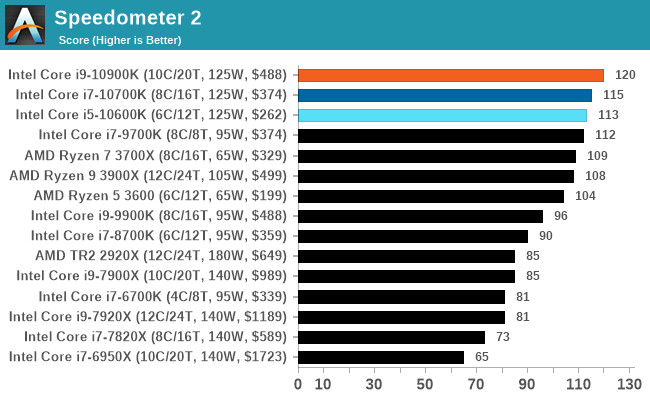
Google Octane 2.0: Core Web Compute
A popular web test for several years, but now no longer being updated, is Octane, developed by Google. Version 2.0 of the test performs the best part of two-dozen compute related tasks, such as regular expressions, cryptography, ray tracing, emulation, and Navier-Stokes physics calculations.
The test gives each sub-test a score and produces a geometric mean of the set as a final result. We run the full benchmark four times, and average the final results.
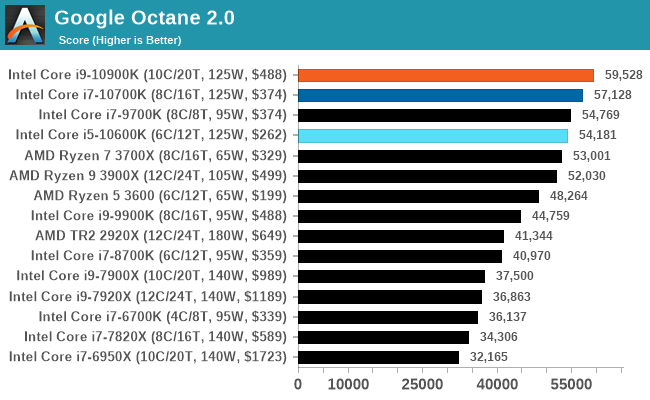
Mozilla Kraken 1.1: Core Web Compute
Even older than Octane is Kraken, this time developed by Mozilla. This is an older test that does similar computational mechanics, such as audio processing or image filtering. Kraken seems to produce a highly variable result depending on the browser version, as it is a test that is keenly optimized for.
The main benchmark runs through each of the sub-tests ten times and produces an average time to completion for each loop, given in milliseconds. We run the full benchmark four times and take an average of the time taken.
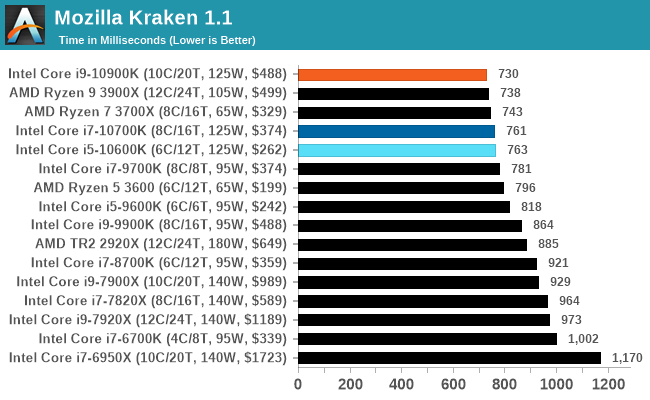
3DPM v1: Naïve Code Variant of 3DPM v2.1
The first legacy test in the suite is the first version of our 3DPM benchmark. This is the ultimate naïve version of the code, as if it was written by scientist with no knowledge of how computer hardware, compilers, or optimization works (which in fact, it was at the start). This represents a large body of scientific simulation out in the wild, where getting the answer is more important than it being fast (getting a result in 4 days is acceptable if it’s correct, rather than sending someone away for a year to learn to code and getting the result in 5 minutes).
In this version, the only real optimization was in the compiler flags (-O2, -fp:fast), compiling it in release mode, and enabling OpenMP in the main compute loops. The loops were not configured for function size, and one of the key slowdowns is false sharing in the cache. It also has long dependency chains based on the random number generation, which leads to relatively poor performance on specific compute microarchitectures.
3DPM v1 can be downloaded with our 3DPM v2 code here: 3DPMv2.1.rar (13.0 MB)
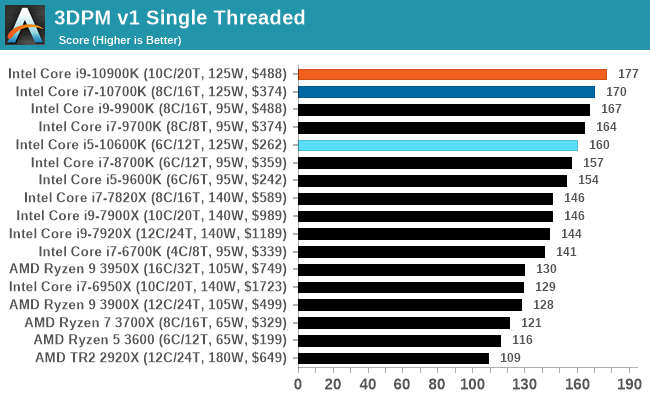
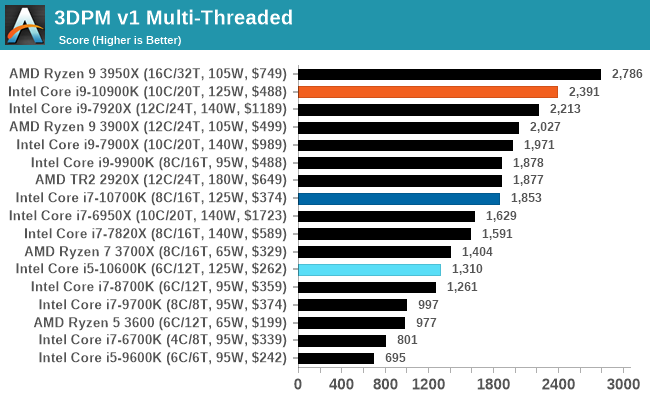
x264 HD 3.0: Older Transcode Test
This transcoding test is super old, and was used by Anand back in the day of Pentium 4 and Athlon II processors. Here a standardized 720p video is transcoded with a two-pass conversion, with the benchmark showing the frames-per-second of each pass. This benchmark is single-threaded, and between some micro-architectures we seem to actually hit an instructions-per-clock wall.
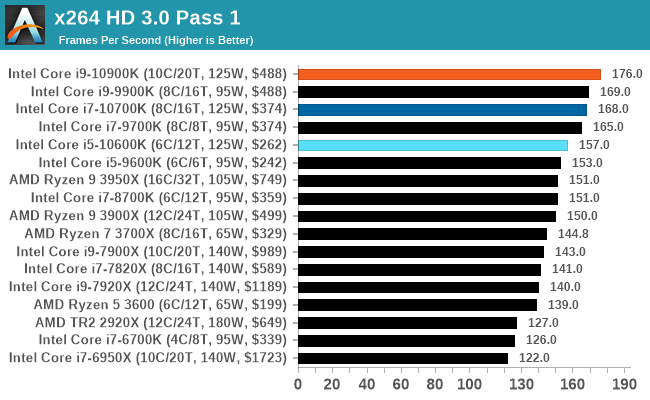
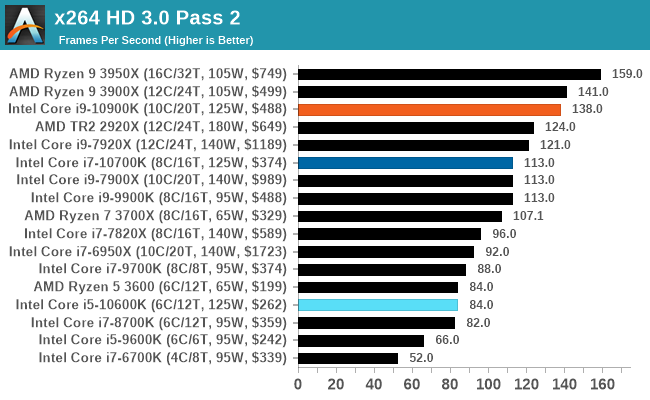










220 Comments
View All Comments
Gastec - Friday, May 22, 2020 - link
Basically you just have to type "allyourbasearebelongtous +$50/surprisemechanic" and you get all the framerate you want in your favorite multiplayer FPShooter.Boshum - Wednesday, May 20, 2020 - link
I think it's a viable alternative to Ryzen 3000, so it's not pointless. It's about equal in performance for most people. A little more expensive and power hungry core for core, but it's more of a flavor thing now. It's still better for certain gaming and application scenarios. Hyperthreading makes the low to midrange a much more reasonable option too, with heat and power being no big deal there. The only place it can't compete with Ryzen is at the very high end for power users doing heavy multi-core work.Dribble - Wednesday, May 20, 2020 - link
I'd be the sort of person to look at a 10700K but power usage is just too high. I want to be able to stick a high end air cooler on it, o/c and still have it run pretty quiet. I'd have to go water with one of these and I can't be bothered with that. Not worth it for the small performance increment over more efficient chips.IBM760XL - Wednesday, May 20, 2020 - link
Agreed. The 10700K and 10900K use more power per core than my ancient-but-trusty 2500K, at least with stock settings. Sure, the new chips get somewhat better IPC, but I can't justify switching from a Sandy Bridge that's nice and quiet even at 100% load, to a Comet Lake that will require Serious Cooling to have an outside chance of being as quiet.I could look at lower-end hex-core Comet Lake chips instead, but why would I do that when I could just as well get an octo-core Ryzen 7 3700, or a Ryzen 5 3600 that will have better performance than an i5-10500?
Boshum - Wednesday, May 20, 2020 - link
I should think the 10500 and 3600 would be pretty close at stock, though you have more overclocking options with the 3600. It's the future Rocket Lake vs Ryzen 4000 options that is more interesting.warrenk81 - Wednesday, May 20, 2020 - link
typo in the dropdown for the final page, move/more.colonelclaw - Wednesday, May 20, 2020 - link
Grammar error, too. Less/fewer.Flunk - Wednesday, May 20, 2020 - link
Well, Intel's back on top for gaming, by a small marging, with chips that can fry an egg. Maybe it'll force AMD to lower their prices on their high-end chips. I don't really fancy a 250+ Watt CPU.DrKlahn - Wednesday, May 20, 2020 - link
You can already get the 3900x for $410 on Amazon. Unless you have a use case that heavily favors Intel that would seem to be a pretty good value already. A good B450 board capable of handling it could be had for not much more than the difference in chip cost (provided that fits your needs).Irata - Wednesday, May 20, 2020 - link
Yup, and like the article says that includes an HSF that will do the job.Contrast that with the 10900k which retails for $530 on Newegg (not available) and which requires you to spend $ 200+ for a proper cooling set up and you are looking at $ 410 vs. $ 730, i.e. paying 56% more for the 10900k. And that does not even include case fans, mainboard, PSU.
If gaming is what one is after, the 9700k looks much more attractive than the 10900k.